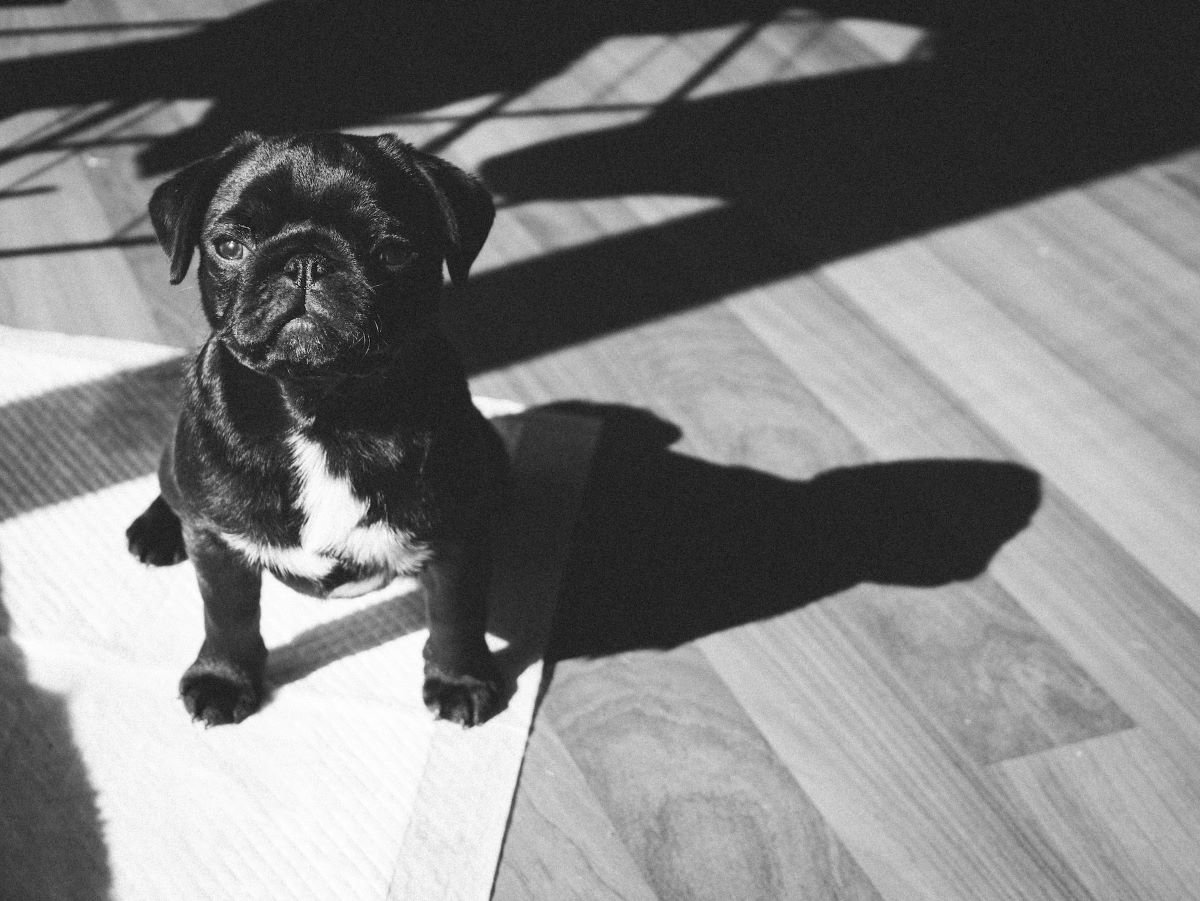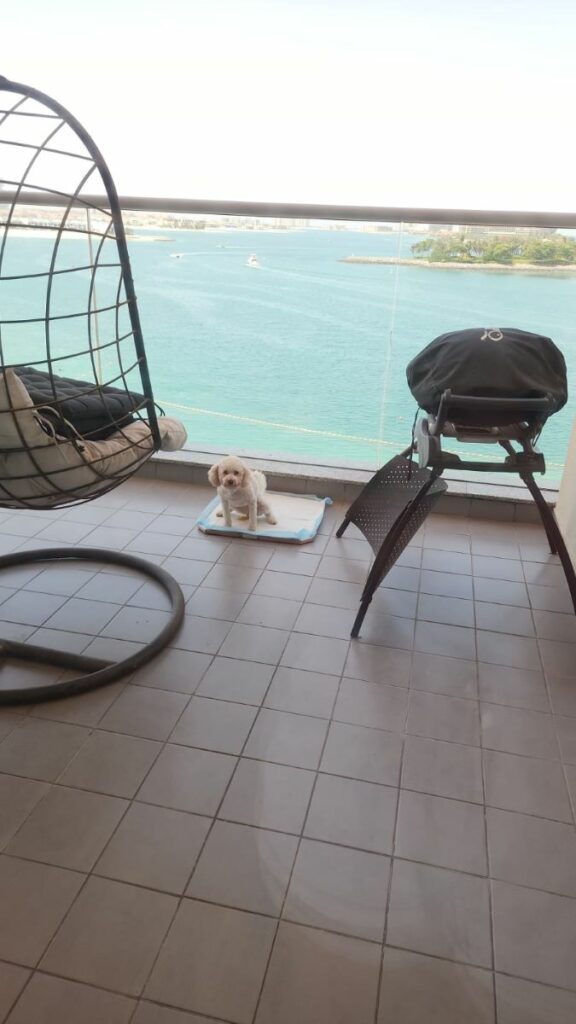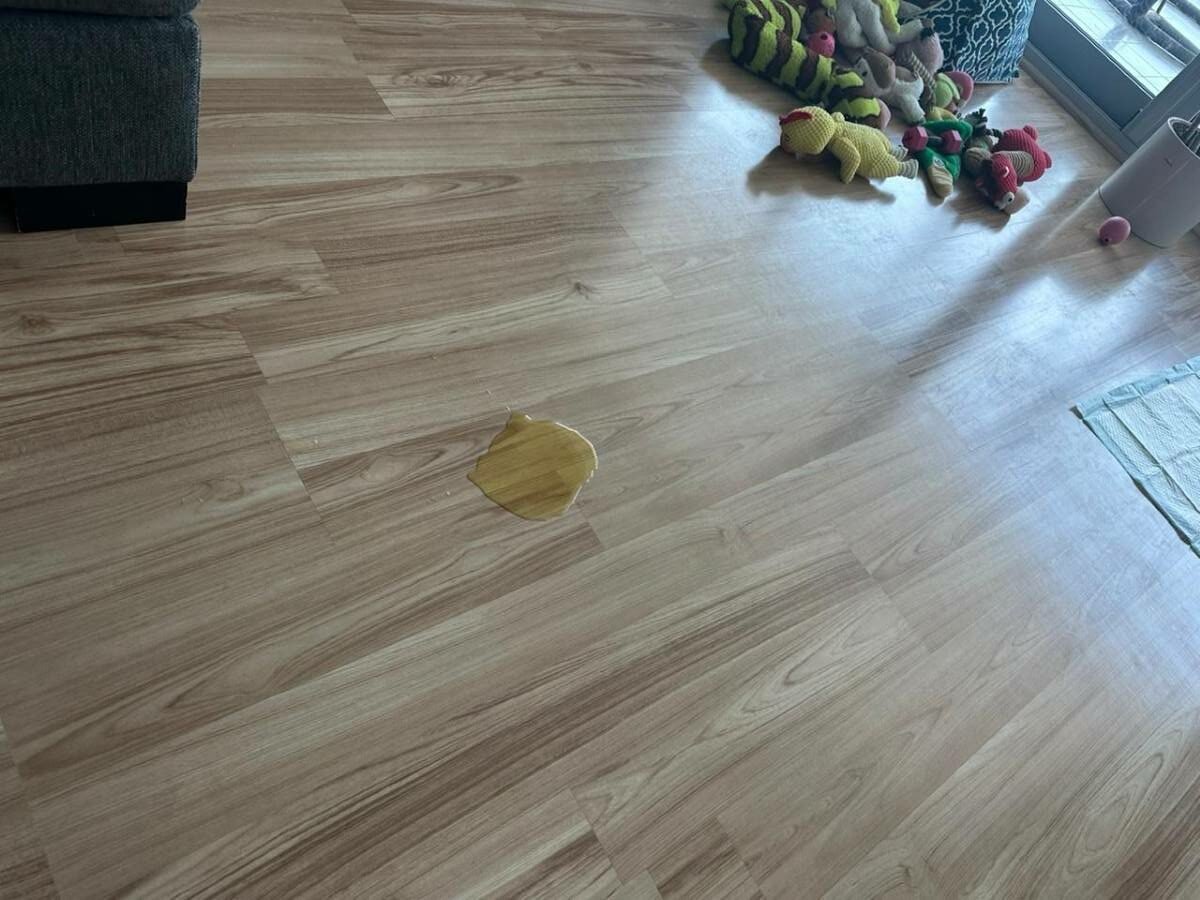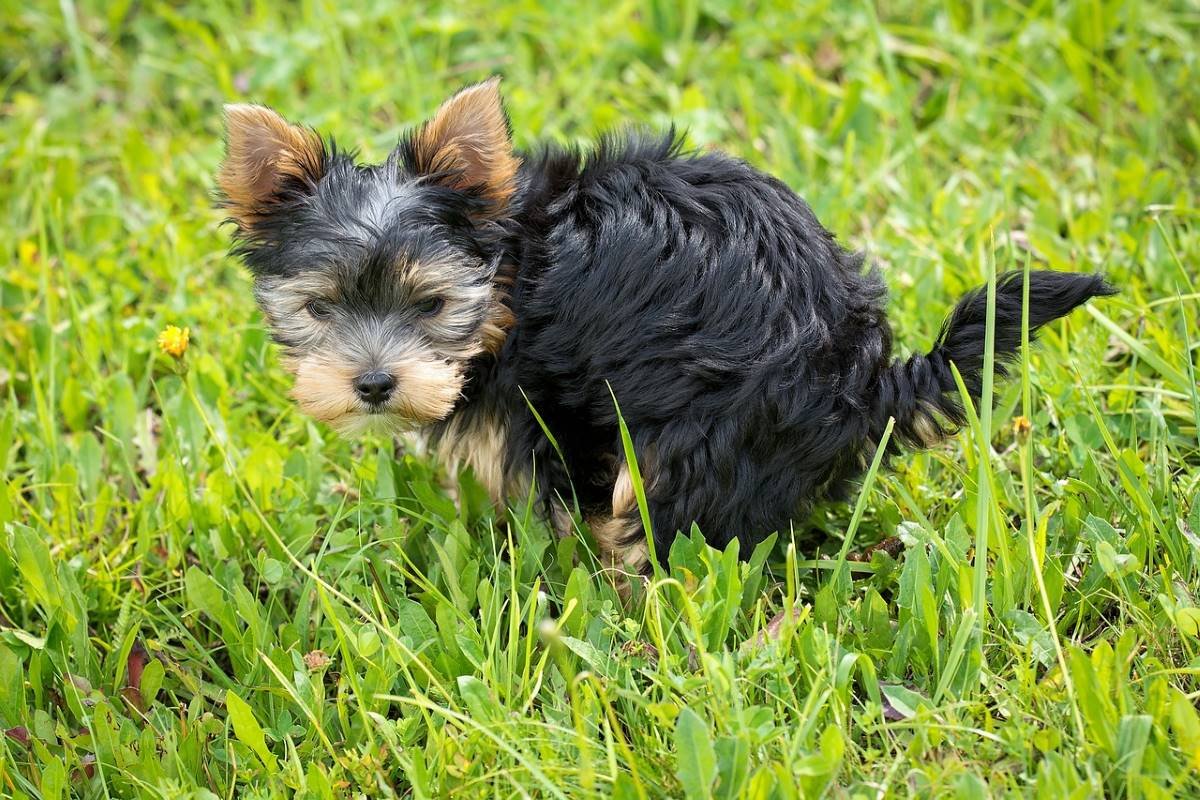We're an affiliate
We hope you love the products we recommend! Just so you know, we may collect a share of sales or other compensation from the links on this page at no additional cost to you. Thank you if you use our links, we really appreciate it!
You look down at the puddle on your floor and are ready to cry with frustration and despair. Why is my puppy peeing every 5 minutes?
You thought you could handle raising a new puppy but now you’re just not so sure. The good news is that your puppy probably isn’t peeing every 5 minutes on purpose.
So, it’s time to look at what may be causing it, this article covers:
- What is normal bathroom behavior for a puppy
- What can cause ‘accidents’ and how to fix it
- When you may need specialized help.
First, let’s dive right into normal bathroom behavior for a puppy.
What Is Normal Puppy Bathroom Behavior
Let’s face it, it’s hard to know how often your puppy needs to go to the bathroom because you don’t feel what they feel and that’s where these guidelines come in.
They will help you determine when to take your puppy outside so they can relieve themselves.
Your puppy is little which means they have much smaller bladders than when they are an adult.
Until puppies are about 9 months old, they need to go to the bathroom every few hours. As they grow, they will be able to hold it longer.
A good rule of thumb is to correspond their age in months with how long they can hold their pee.
For example, a 3-month-old puppy needs to go out every 3 hours while a 6-month-old puppy needs to go out every 6 hours.
Keep in mind that every dog is different. Different-sized dog breeds will have different limits for how long they can hold it so even with this rule, it may take some trial and error.
But if your puppy is really struggling to hold their pee, it may be time to check and see if there is a medical reason.
Why Is My Puppy Peeing Every 5 Minutes – Medical Reasons
There are several medical conditions that affect your puppy’s ability to hold its pee. Let’s dive into them and hopefully rule them out for you.
Urinary Tract Infection (UTI)
UTIs occur when bacteria get into the urethra and make it hard for a puppy to hold their pee. You may recognize the term from your own experience, as even humans can get UTIs.
Some common symptoms of a UTI:
- Frequent peeing of small amounts
- Straining to pee
- Blood in the pee
If you suspect your puppy has a UTI, don’t panic, this is an easy issue to treat. But, they will most likely need antibiotics to clear it up. Make sure you communicate your concerns to your vet and get the proper treatment.
If your puppy doesn’t have a UTI, it may be a more serious medical issue.
Diabetes
Diabetes can affect puppies from a very young age. Just like in humans, it affects a puppy’s ability to produce or absorb insulin.
The result is high blood sugar levels causing the puppy’s kidney to release water and empty their bladder.
Some common symptoms of Diabetes in puppies:
- Peeing while they sleep
- Excessive water drinking
- Frequent peeing of normal or excessive amounts
There is no cure for diabetes, but it can be managed. Make sure you consult your vet if your puppy exhibits any signs of diabetes. It’s important to start managing it as soon as possible.
If you’ve managed to rule out UTIs and Diabetes, your puppy may suffer from kidney issues.
Kidney Issues
There are a few different kidney issues that can cause your puppy to struggle with holding their pee.
Kidney infections often present like UTIs and cause a lot of the same symptoms, they can also be treated with antibiotics.
Just like humans, puppies can get kidney stones and these can be caused by kidney disease.
Symptoms of kidney stones:
- Frequent peeing of small amounts
- Vomiting
- Weight loss
- Depression
- Blood in pee
- Difficulty peeing
- Recurring UTIs
- Crystals in pee
While it is sometimes necessary for stones to be surgically removed this isn’t always the case.
A lot of times your vet can prescribe specific foods or medicines that cause the stones to dissolve.
If your puppy has had one kidney stone, be on the lookout for more as they can reoccur.
Kidney disease is another less common kidney issue that your puppy could have. If your puppy has kidney disease their kidney is likely struggling to remove waste from the body.
Your puppy will exhibit a lot of the same symptoms they had with kidney stones and may even have kidney stones. Make sure you are working with your veterinarian if you suspect kidney disease.
Now that you’ve ruled out medical reasons for frequent peeing, it’s time to check behavioral reasons.
Why Is My Puppy Peeing Every 5 Minutes – Behavioral Reasons
It’s great that your puppy isn’t ill, but it can be hard to know what to look for next as the reason for excessive peeing – and how to fix it. But don’t worry, there’s an answer to that.
Excitement or Anxiety
Your puppy is just a baby, they are still learning how to control their bladder, and big emotions can make this even harder.
As your puppy gets older, they will likely grow out of these accidents. In the meantime, there are a few things you can do to make your life easier.
If your puppy is peeing due to excitement, cover their play areas in pee pads.

Don’t punish them for these accidents, they are not doing it on purpose, and they can’t help themselves. Frequent exercise and mental stimulation are also great ways to combat this.
If your puppy is peeing because they are anxious, they lack confidence so try to increase their socialization.
In the meantime, make sure they have a hiding place to go to when they’re scared. A crate or dog bed in a quiet area of the house is preferable.
Make sure you use positive reinforcement, you don’t ever want to yell at your puppy and be the cause of their anxiety-fueled peeing.
Building your puppy’s confidence in you is crucial to your success in getting rid of this behavior.
If it isn’t excitement or anxiety, it could be that your puppy is acknowledging you as their leader.
Submissive Urination
Puppies recognize a hierarchy. If they pee when you, other people, or other dogs approach them, they may be acknowledging you as being in charge.
While this can be frustrating, puppies will generally grow out of this habit as they grow up.
You may be able to tell your dog is peeing in submission if they exhibit these other signs:
- If they pee when they’re crouching
- If they pee when they roll and show you their belly
- If they pee when they are in trouble or scolded
- If they pee when they hear loud noises
Stopping these common submissive responses can help stop submissive urination. Use positive reinforcement to build your puppy’s confidence to end this behavior.
Actionable ways to end this behavior:
- Redirect their attention by taking them outside
- Give them a treat to use up excited energy
- Remain calm and composed if they are extra excited when you greet them
- Teach them a new skill for when they greet someone (sit or shake) and then offer a treat
When you’ve ruled out medical and behavioral reasons for excessive peeing, it’s time to look into environmental causes.
Why Is My Puppy Peeing Every 5 Minutes – Environmental Factors
Environmental factors for your puppy’s frequent peeing can be frustrating, but they are also often the easiest for you to correct.
Lack of Proper Housetraining
Make sure that when you housetrain your puppy, you use consistent training methods.
Confusing your puppy when you are training them can be the number one mistake new puppy owners make.
The best methods to use when house training:
- Develop a consistent potty routine
- Take your puppy outside after every meal and water break
- Give your puppy lots of praise and positive reinforcement when they go to the right spot
- Stay outside for a while even after your puppy has peed, make sure their bladder is empty, and reward them for going
- If they have an accident in the house, thoroughly clean the area so no smells remain
If your puppy is still struggling, there is likely a good reason.

Inadequate Potty Breaks
Even if you think you are doing a good job with your puppy, you may just not be doing quite enough.
If you don’t take your puppy outside enough or for long enough, it can lead to a lot more accidents in the house.
Puppies don’t have complete control over their bladder, so it is important to give them more opportunities to pee than you think are necessary.
Remember when we talked about puppies being able to hold it for the same number of hours that they are months old?
This can be a good guideline for setting up a schedule for you and your puppy. If you have a 3-month-old puppy, maybe take them out every 2-2.5 hours. Then as they get older, you can lengthen the time by an hour or so.
- 3 months: 2 hours
- 4 months: 3 hours
- 5 months: 4 hours
- 6 months: 5 hours
When your puppy is fully grown, they should have good potty habits. Their bladder capacity and control will allow them to sleep through the night without needing a potty break.
You should never push your puppy to hold their pee too long. Also, if your puppy has eaten or drunk water, realize that this timing will likely need to be shortened.

What Is the Influence of Diet and Hydration on Urination for Puppies
Food and water influence your puppy’s digestive system, so when your puppy drinks or eats, it affects when you should plan on taking them out.
Water Intake
If your puppy is drinking excessive amounts of water, they are going to have to pee a lot more.
Take your puppy out for a potty break after they drink. But still, monitor their water intake to make sure they aren’t overdrinking.
Puppies need about ½ ounce to 1 ounce of water per pound of body weight, so if you have a 6lb puppy, they will need 3-6 ounces of water a day.
To determine how much water your puppy should drink, measure out the “correct” amount in the morning.
Then keep track of their drinking habits throughout the day. There are various factors that affect this amount such as weather and exercise, but this is a good guideline to follow.
The other factor that can affect your puppy’s potty habits is eating.
Dietary Factors
Puppies pee after eating due to the water content in their food. Dry food contains 10% water content and wet food contains about 80% water content.
Puppies generally pee between 5-30 minutes after eating, this depends on how full their bladder was before their meal and how much water they had.
If your puppy is peeing excessively while eating, it may be time to change their diet to dry food.
If they are already on dry food, choose food that contains less fat, this is something your vet could help you with.
When to Consult a Veterinarian
Getting your puppy veterinary care early can help your puppy to thrive. The longer your puppy suffers from medical symptoms, the harder it is on them.
Red flags that signal you need a vet to help:
- Straining or signs of discomfort when trying to pee
- Blood or an unusual color in the pee
- Pee that has a weird smell
- Drinking way more than usual
- Peeing in inappropriate places
- Leaking pee in places
- Excessive licking or scooting their butt along the floor
If your puppy has a combination of 2 or more of these symptoms it may be time for a vet check.
A quick diagnosis is important to clear up your puppy’s symptoms and prevent them from getting worse.
What are some of the most common questions relating to why your puppy is peeing so much?
FAQs
Why is my puppy peeing so much all of a sudden?
Your puppy could be peeing so much due to a medical, behavioral, or environmental issue. Determining the signs and symptoms is important to determine which one it is.
How can I differentiate between normal puppy behavior and a medical issue?
Give your puppy adequate potty breaks. Make sure they aren’t excited, anxious, or submissive. Once you rule these out, your puppy may have a medical issue that is causing them to pee excessively.
Can changing my puppy’s diet help with excessive urination?
Yes, if your puppy is peeing too much it may be a good idea to switch to dry food or food that has less fat content.
Are there specific training techniques to address frequent urination due to anxiety?
If your puppy is anxious, give them a safe space to hide where they feel comfortable. Then work to increase your puppy’s socialization and confidence using positive reinforcement.
To Conclude
If your puppy is peeing every 5 minutes, it may be time to look for the underlying causes.
Frequent potty problems can be medical, behavioral, or environmental. Understanding the signs and symptoms can determine if it’s time to go to a veterinarian.
Or, use positive reinforcement training techniques to give your puppy better potty habits.
Laura is the founder of Furs'n'Paws. She is a also a pet writer and expert with more than 20 years of experience of working with dogs and cats. She developed a very strong love for animals at a young age. Her passion led her to establish a thriving pet sitting and dog walking business in Dubai. As an expert in pet training, behavior, and nutrition, Laura is committed to helping pet owners and pet lovers by offering high-quality information on a wide range of topics.



No responses yet